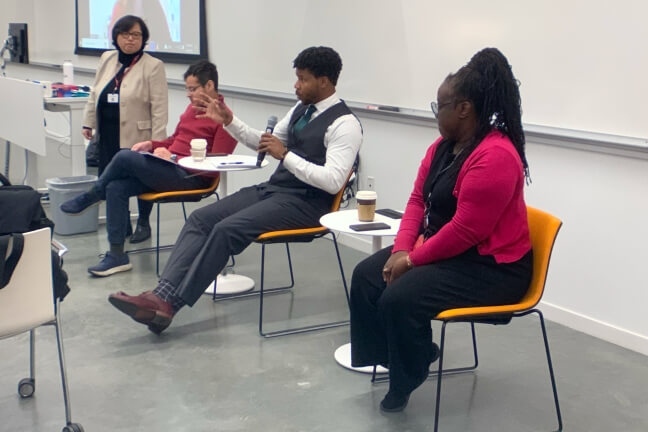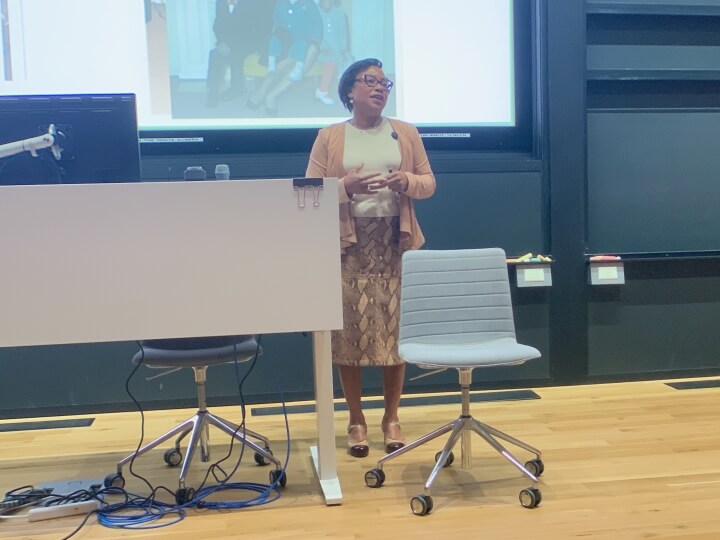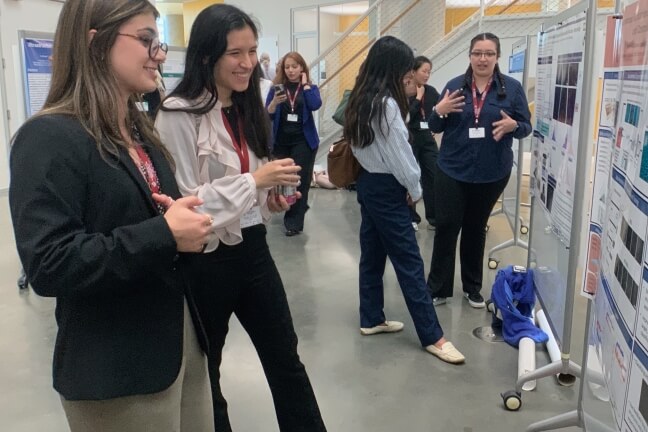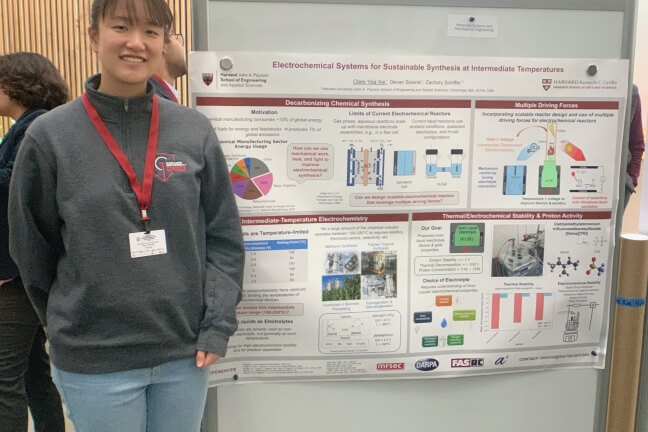News
The challenges graduate students face can often feel at odds with one another. The student is expected to contribute to the ongoing research in their lab, yet at the same time has to conduct novel research that will set them up for success once they graduate. Few Ph.D. research projects can be completed entirely by an individual, but at the end of the day the student must defend their dissertation on their own, and it’s only their name on the degree. Ph.D. researchers sometimes feel like students, and sometimes they feel like employees.
Feeling pulled in so many directions can be hard for any graduate student. But it can be even more difficult for traditionally underrepresented groups in engineering and the applied sciences, because there can also be feelings of isolation or loneliness.
Finding community, whether it’s within your lab or elsewhere on campus, was the common theme at the Ivy Collective Symposium, which recently took place at the Harvard John A. Paulson School of Engineering and Applied Sciences (SEAS). Organized by the SEAS Office For Diversity, Inclusion, and Belonging, the event brought together students from all eight Ivy League colleges and universities, as well as MIT, for a series of panels, lectures and workshops designed to help graduate students from diverse backgrounds meet each other, learn about each other’s research and gain useful skills and perspectives on how to navigate their degrees.
“We believe in the need for a community of engineers from all backgrounds, experiences and perspectives to drive innovation and advanced discovery,” said SEAS Dean David Parkes. “We can’t solve these problems alone.”
“Academia, Industry, and Nontraditional Career Paths for Engineering Ph.D.” panel with Matheus Ferreira, Akil Word-Daniels and Katie Hixon, Assistant Professor of Engineering at Dartmouth (Matt Goisman/SEAS)
Hana Warner, an applied physics Ph.D. student at SEAS, talks with MIT postdoctoral researchers Abriana Stewart-Height and Jenn Kim at the "Successfully Navigating Your Engineering Ph.D" panel at the Ivy Collective Symposium (Matt Goisman/SEAS)
Hana Warner knows what it’s like to both have a community, but also to lose it. An applied physics Ph.D. student in the Laboratory for Nanoscale Optics at SEAS, Warner began her studies in the early months of the COVID-19 pandemic. When many of the older researchers graduated in her first and second year, Warner suddenly had to go from the newcomer learning the ropes to a leader expected to help run the lab. To handle that pressure, Warner began to look beyond her lab for community.
“I think it's really important to find activities that you like to do,” she said. “I got really into pottery and playing sports. I'm okay at them, but I have so much fun. I get to work with other people and make things that I'm proud of, even if it's not perfect. That’s similar to a lot of things that will happen in your research.”
Warner was one of three students who spoke at a panel entitled “Successfully Navigating Your Engineering Ph.D.” Warner and MIT postdoctoral researchers Abriana Stewart-Height and Jenn Kim all reiterated the importance of balancing one’s own needs with those of the lab, and how invaluable community can be.
“It's really good early on to get good mentors, people in your corner,” Stewart-Height said. “Obviously you do want to help your advisor with their own research, but you are also doing a Ph.D. for you, for your research, and for your future career as well.”
Dr. Paula Hammond, Vice Provost for Faculty and professor of chemical engineering at MIT, delivers the keynote address at the Ivy Collective Symposium (Matt Goisman/SEAS)
The importance of mentorship was also highlighted by the symposium’s keynote speaker, Dr. Paula Hammond, Vice Provost for Faculty and professor of chemical engineering at MIT. Hammond shared that when she was selecting her Ph.D. advisor and committee as a student at MIT, she deliberately sought out the people who could teach her not only chemical engineering, but also life skills to thrive in academia and research. Hammond has since gone on to become the first woman and the first Black professor to become head of MIT’s department of chemical engineering, as well as a member of the National Academies of Science, Engineering and Medicine, and the American Academy of Arts and Sciences, among many other honors. She is currently researching the development of nanoparticles that can prevent the recurrence of ovarian cancer cells after chemotherapy.
“It took years for me to understand that people who were close to me were advocating for me,” she said. “It helps for you to recognize in your own lives that there are people who are those voices, and will be able to speak for you even when you don’t know they are. That’s a good reason to cultivate multiple kinds of interactions with me.”
Hammond’s address also marked the inaugural SEAS Distinguished Lecture, a new series run by the Office For Diversity, Inclusion and Belonging at SEAS. This lecture was supported by Sheldon Weinbaum, S.M. '60, Ph.D. '63, a longtime activist for greater diversity and representation in academia and engineering.
“Minoritized groups often experience a different kind of research environment,” said Hammond. “Having that ability to recognize and create environments in which everyone feels they can contribute, have all their voices present and are thriving, gives you this research environment in which much more can be accomplished. There’s much more innovation, there’s much more opportunity to exchange ideas, and you’re also able to have more effective problem solving. Researchers from different parts of the world or perspectives bring different ideas of what problems we should be working on, and this can be eye-opening. We can have new tools directed at problems that are critical to the world.”
Another panel, entitled “Academia, Industry, and Nontraditional Career Paths for Engineering Ph.D.,” featured Microsoft security program manager Akil Word-Daniels; Katie Hixon, Assistant Professor of Engineering at Dartmouth; and Matheus Ferreira, Assistant Professor Computer Science at the University of Virginia. The symposium also included a resume and CV workshop, and a poster session featuring researchers from all attending schools. Clare Yijia Xie, a materials science and mechanical engineering Ph.D. student in Professor Zachary Schiffer’s Electrochemical Engineering Lab, presented her research on using electrochemistry to decarbonize the chemical industry, a significant source of global CO2 emissions.
“Diversity in science and engineering has always been very close to my heart, but it wasn’t until I started my Ph.D.that I truly realized how important it is,” she said. “Women and minorities are often less represented in engineering, and it’s great to have a platform for us to practice presenting our research and gain valuable skills and insights from the people who came before us.”
Students gather for the poster session at the Ivy Collective Symposium (Matt Goisman/SEAS)
Clare Yijia Xie, a materials science and mechanical engineering Ph.D. student at SEAS, is researching using electrochemistry to decarbonize the chemical industry (Matt Goisman/SEAS)
The symposium concluded with a three-minute thesis presentation competition. Dartmouth College engineering science Ph.D. student Ene Michelle Igomu took first place with her presentation on research into clean energy production.
“Being in the sciences, one of the first things you learn is that you can’t do it alone,” Igomu said. “The problems we’re trying to solve are so complex, which means the solutions will also be complex. You need to pull in from other fields of expertise to build that network and improve the solution. It’s also about finding that same sense of belonging. Knowing that there are other people going on the same journey as you, and that you’re not alone, helps make the journey easier.”
Topics: Academics, Diversity / Inclusion
Cutting-edge science delivered direct to your inbox.
Join the Harvard SEAS mailing list.







